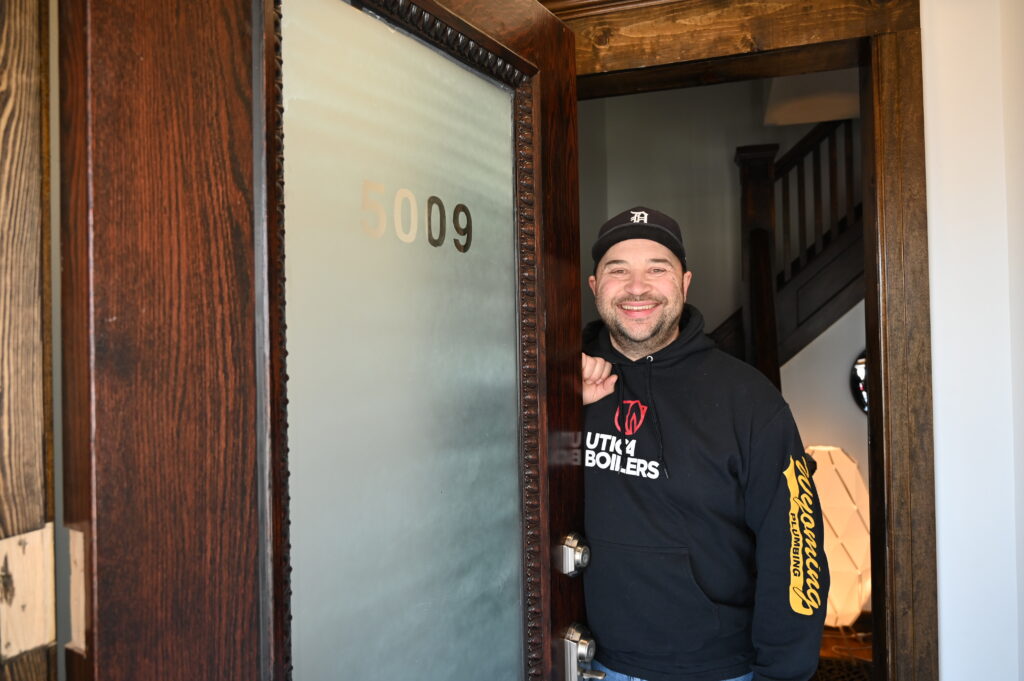Source: Special to Michigan News
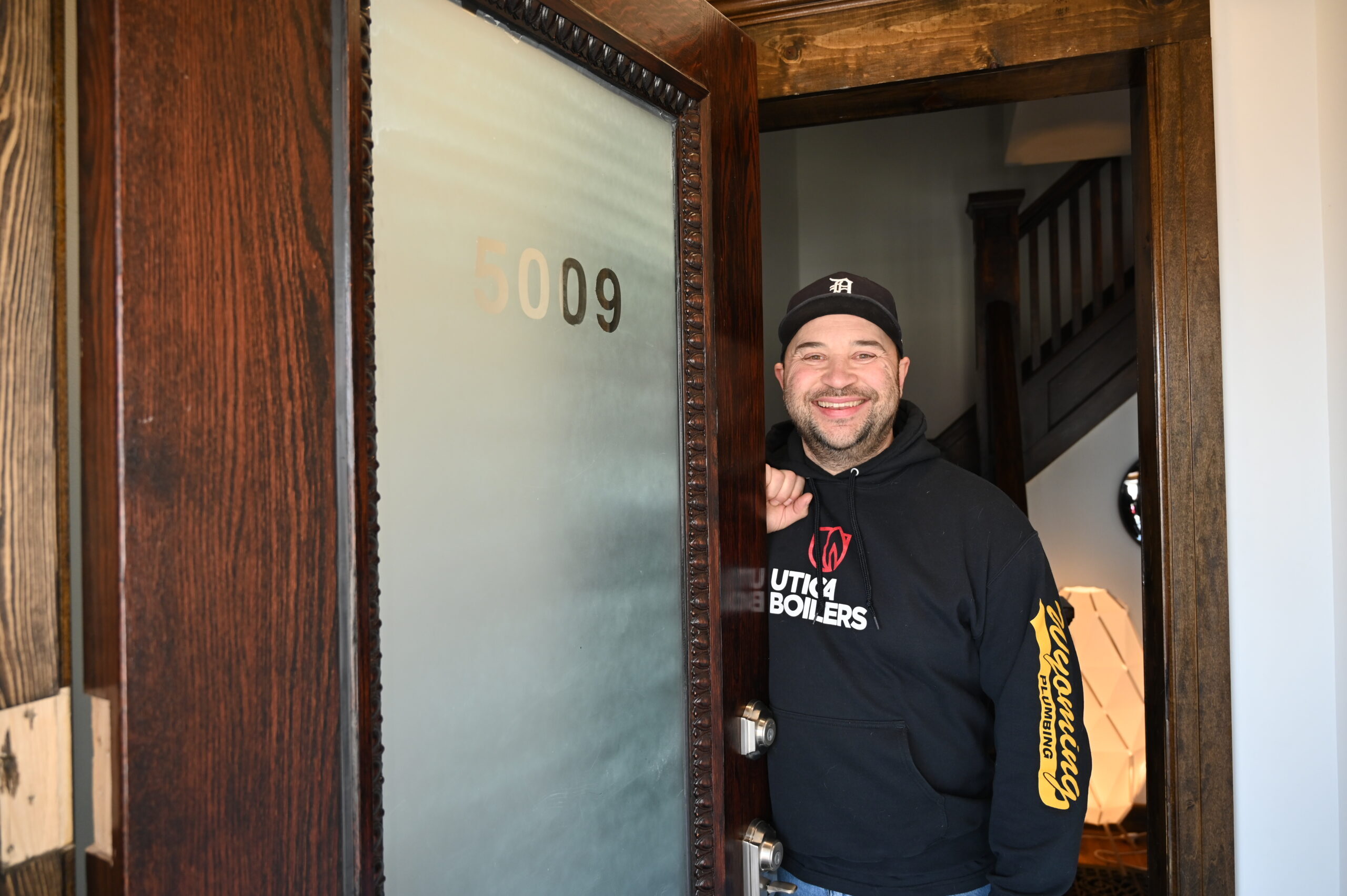
Jon Zemke at one of the renovated units at LaFerte Terrace in Detroit’s Woodbridge neighborhood. Credit: Greta Guest.
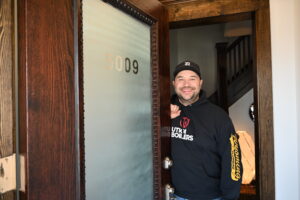
Jon Zemke at one of the renovated units at LaFerte Terrace in Detroit’s Woodbridge neighborhood. Credit: Greta Guest.
Jon Zemke is working to ease Detroit’s housing shortage one rehabbed home at a time.
A University of Michigan graduate and a self-described “recovering journalist,” Zemke has acquired dozens of dilapidated housing units, commercial buildings and vacant land parcels since first easing into becoming a builder and landlord in 2009.
“I was tired of looking at blight. I wanted to do something about it,” Zemke said about buying his first rental house in New Center Commons for $18,500. Everything after that was significantly cheaper for nearly a decade.
Zemke and his wife, Kristin Lukowski, purchased the home through a bank foreclosure and were the only bidders. Distressed Detroit real estate wasn’t exactly a hot commodity at the time.
“You couldn’t give houses away,” he said.
Zemke and Lukowski renovated the home, rented it out for $900 a month and launched Zemke Lukowski Properties.
After juggling his journalism career and real estate work for a few more years, Zemke decided to stop writing and strap on his tool belt full time in 2016. He acquires properties, many of them townhouses and duplexes in Detroit’s Woodbridge neighborhood, through private sales, foreclosures, and a few from the city’s land bank.
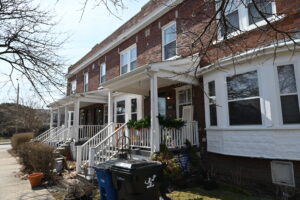
LaFerte Terrace
Zemke is a licensed builder and expects to receive his masters in real estate degree this year from DePaul University in Chicago.
His units mostly rent for market rates. Creating a diverse community is central to Zemke’s development philosophy.
“We have 50 tenants of all ages, incomes, creeds and races,” Zemke said. “I’m very proud of this. We have a very diverse client base.”
Zemke also has helped tenants start on a path to a better life. Some of them also work for him.
“A friend of mine said I take in all the strays, which is not untrue,” he said.
There’s Sofia, for instance, whom Zemke describes “as the best tenant in the world. In the early days, she was one of our eyes and ears at LaFerte Terrace when we were renovating the townhouses. Now, and more importantly, she’s our friend who is excited about living there, and who has significantly improved her own life in that time, going from a store clerk and a Lyft driver to a full-time teacher at DPS.”
Zemke’s vision is to build a variety of housing types that serve everyone from young families to single people living on the edge. That will require zoning changes allowing for more multifamily dwellings, he said.
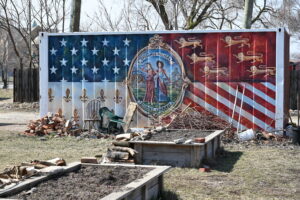
Mural painted on a storage container in the garden at LaFerte Terrace.
“We want to build housing for everyone from young people trying to find their place in this world to older single people looking for a clean, safe home,” he said. “There is too much emphasis on building bigger housing for young families, i.e. single-family houses. We want to build smaller homes for everyone else, which requires zoning changes for more dense, multi-family dwellings.”
Real estate wasn’t the career Zemke had in mind during his undergraduate day at U-M. He started as a kinesiology major hoping to walk on to the football team, but an injury ended that dream. He ended up earning a bachelor’s degree in sports management and communication in 2000.
Zemke said his U-M education helped him prepare for a career that offers complex challenges on a daily basis.
“U of M really taught me how to persevere in tough times,” said the third-generation U-M grad. “It gave me the foundation to do what I do now.”
His grandparents, Walter and Lucille Zemke, graduated from U-M in the 1920s. They went on to be lifelong teachers at Dexter Community Schools. His great uncle William Zemke owned The Orient (a barber shop/pool hall/cigar store/saloon) in downtown Ann Arbor a century ago that was immortalized in the “I want to go back to Michigan” song that’s sung by the U-M glee club.
Zemke’s parents own a half dozen rental houses in and around Ann Arbor that family members have built over the last century, some of which are occupied by U-M students. Zemke Lukowski Properties is funded by several U-M alumni and professors.
Zemke, a Whitmore Lake native who has lived in Detroit since 2005, said he’s optimistic about the city’s future.
“Detroit is the most underrated and undervalued big city in the country, bar none,” he said. “We’ve gone through so many of the hard parts that the foundation is set for a long road of success.”

